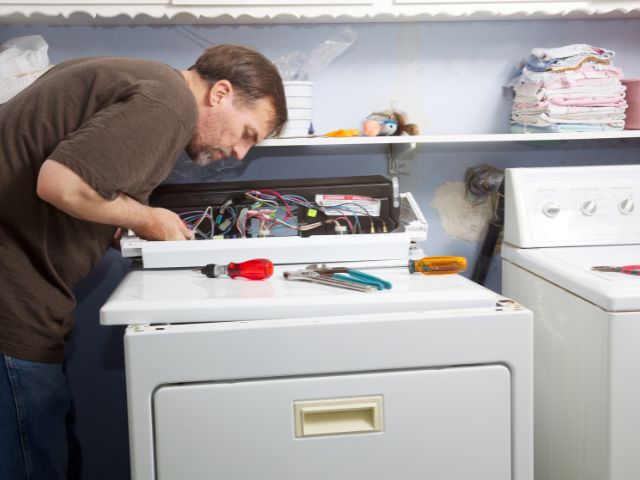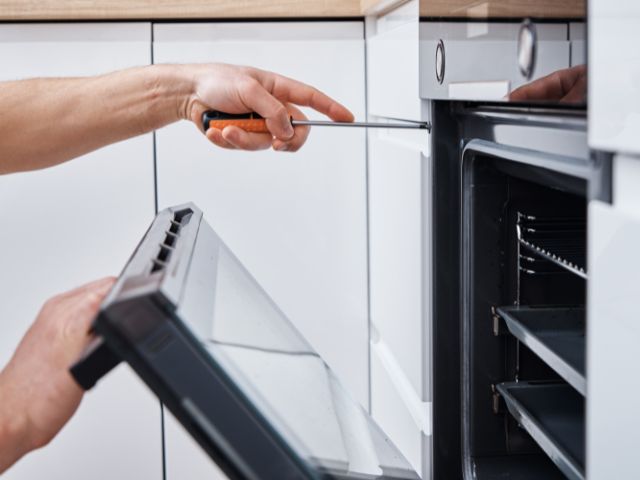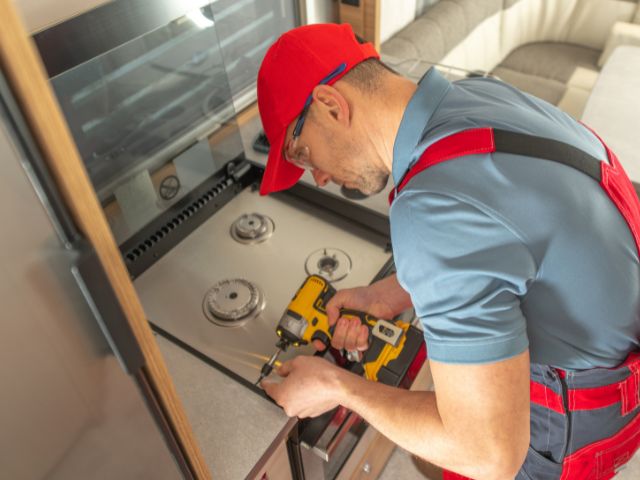An oven smell can change a nice cooking time into a bad one. It might be the leftover smell of last week’s lasagna or a weird chemical scent. No homeowner wants to deal with a smelly oven. The good news is that you can get rid of most odors by cleaning your Viking oven properly and knowing a few tips. This guide will cover common reasons why your oven smells weird, how to spot them, and the best cleaning methods for a fresher-smelling appliance.
Identifying Common Oven Odors

Recognizing where the bad smell from your oven comes from is the first step to getting rid of it. The smell can help you find its source and choose the best cleaning method. For example, the strong scent of burnt food or strange chemical smells can tell you a lot. Knowing these odors can be very useful.
The Unmistakable Smell of Burning Food Residues
The most common oven smell is burnt food, easily recognizable by its blackened appearance from spills or splatters heated in the oven. The intensity of the smell depends on the type and degree of burning. For minor cases, a damp cloth can usually suffice once the oven cools. Stubborn residue may require baking soda paste, vinegar solution, or specialized oven cleaners for cleaning. Swift action prevents the smell from permeating your home and affecting the taste of future meals.
Chemical Odors and Their Sources
Burnt food can cause smells in ovens. New ovens might emit chemical odors during initial use. To address this, follow the manual’s instructions to “burn in” the oven by running it at a high temperature briefly. If a strong chemical odor persists or suddenly appears in an older oven, investigate further. Unusual electrical smells like plastic or gas odors require immediate attention from a trained technician to prevent safety hazards.
Step-by-Step Guide to Cleaning Your Oven

Cleaning your oven may feel like a big job, but you can make it easier by doing it one step at a time. Whether you choose to use natural products or store-bought cleaners, following a clear plan helps you clean every part well and avoid any dangers.
This section will give you a complete guide. It will cover everything from getting your supplies ready to the last wipe-down for your clean oven.
Natural Solutions for a Fresh-Smelling Oven
For people who want to dodge strong chemicals, there are some natural ways that work well to remove oven odors and make your kitchen smell nice. You can use common items at home that are safe and effective:
- Baking soda paste: By mixing baking soda with water, you can make a paste. Put this paste on the inside of your oven. Let it sit overnight, then wipe it off with a damp cloth. Baking soda will help soak up and get rid of bad smells.
- Vinegar solution: Mix equal parts of water and white vinegar. You can spray this mixture on your oven or use it to wipe the inside. Vinegar is a natural way to freshen up the space and clean away grease and dirt.
Using these natural cleaning methods will not only help remove the unpleasant odors but also provide a safer choice. This is great, especially for homes with young kids or anyone who reacts strongly to tough chemicals.
When to Use Chemical Cleaners Safely
While natural cleaning methods can work well, tough, burnt-on stains may need commercial oven cleaners. These cleaners have strong chemicals that break down grease and leftover food. It’s important to use them carefully and safely by following these tips:
- Ventilation is key: Open windows and turn on exhaust fans to keep air flowing in your kitchen.
- Protect yourself: Use gloves and goggles to avoid touching the cleaner.
- Follow instructions carefully: Stick to the directions on the product label. Pay attention to how long you should leave it on and the safety tips provided.
By using these cleaners wisely, you can use their strength while keeping risks low.
Gathering necessary supplies and tools
Before you start, collect the tools and supplies you will need. Having everything ready helps make the cleaning easier.
Here’s what you need:
- Cleaning Solution: Pick your favorite way to clean. You can use a natural solution like baking soda or vinegar, or you can choose a store-bought oven cleaner.
- Protective Gear: Keep yourself safe by wearing rubber gloves to protect your hands. If you are using a strong chemical cleaner, consider wearing eye protection as well.
Having these supplies ready will make your oven cleaning quicker and more effective.
Removing oven racks and other removable parts
To clean your oven well, begin by taking out the oven racks. These racks usually gather a lot of food spills and grease.
- Soak in soapy water: Fill a sink or a bathtub with hot, soapy water, then put the racks in it. Let them soak while you clean the inside of the oven.
Taking out these parts helps you get to the oven’s inside more easily and makes cleaning both the oven and the removable parts better.
Applying a cleaning solution to the interior of the oven
With the racks out, let’s clean the inside of the oven. You can use a simple mix of baking soda or a store-bought oven cleaner. Make sure to spread it well on all the surfaces.
Here’s how to do it:
- Focus on greasy spots: Look closely at the bottom, sides, and back where grease builds up.
- Avoid heating parts: Be careful not to get cleaner on the heating elements.
Make sure you cover everything for the best cleaning and to get rid of odors. Let the cleaner sit for the time it recommends. This helps to break down the grease and dirt.
Scrubbing and wiping down the interior of the oven
Once the cleaning solution has done its job, it’s time to scrub! Use a non-abrasive sponge or a cleaning brush to help remove tough grime.
Follow these steps:
- Use some effort: For baked-on food, you may need to scrub a bit.
- Rinse well: After scrubbing, take a clean, damp cloth or sponge and wipe down all surfaces inside. This will get rid of any leftover cleaning solution.
A thorough cleaning will not just remove dirt and grime, but also bad smells.
Cleaning and replacing oven racks and other parts
While the inside of the oven dries, this is a good time to clean the racks and other parts you took out.
Here’s an easy way to do it:
- Scrub the racks: Use a scrub brush or steel wool to get rid of any tough spots sticking to the racks.
After cleaning, rinse the racks well and dry them completely. This makes sure there is no cleaning solution left on them and that they are ready for your next cooking experience.
Tips for preventing future odors in your oven
Preventing bad smells in your oven is important for keeping it fresh.
Here are some steps you can take:
- Clean spills right away: After using the oven, while it’s still warm (but not too hot), wipe up any spills with a damp cloth.
- Cover your food: When you are baking or roasting, use lids or aluminum foil to cover your dishes. This will limit spills and stop grease from getting on the oven walls.
By making these easy choices a part of your routine, you can lower the chances of bad odors in your oven. This helps your appliance last longer and makes cooking more enjoyable.
Conclusion
If your oven smells funny like a smell of rotten eggs or an odor of the unburned gas, it’s important to find out why right away. This helps keep your cooking safe and enjoyable. By knowing why your oven smells weird and what are normal, as well as following a good cleaning guide, you can remove bad odors and keep your oven smelling fresh. Make sure to use natural cleaners or chemical ones carefully, depending on the smell. Cleaning regularly and taking steps to prevent odors will help avoid problems later. For more tips, check out our blog on the right cookware for Viking ovens.
Frequently Asked Questions
Why does my oven smell like it’s burning?
A burning smell usually means there is food stuck in your oven. It could be spills, crumbs, or grease on the heating parts that burn while you use it. By deeply cleaning your oven, you can get rid of these bad odors.
Can oven smells be harmful to my family’s health?
Some bad smells from your oven are just that—bad smells. However, some could be dangerous. A gas smell means you need to act quickly because it shows there may be a leak. Other odors can cause allergies or breathing problems.
How often should I clean the oven cavity to prevent odd smells?
The frequency of cleaning depends on how often you use it. A good rule is to clean your oven every 3 to 6 months. If you use it a lot, then clean it every month. Wiping it down after each use also helps stop odors from building up.






